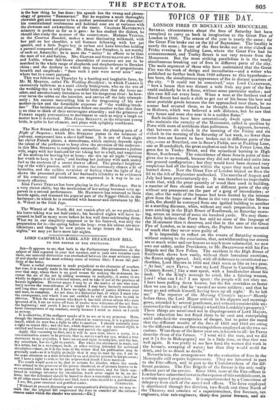LORD CAMPBELL'S LIBEL AND DEFAMATION BILL. TO THE EDITOR OF
THE SPECTATOR.
23d August.
Sin—It appears to me, that both in the Parliamentary discussions on the subject of libel reported in your last number, and in your own remarks upon them, one material distinction was overlooked between the most ordinary cases of oral slander and the most ordinary cases of written libel; I mean the pub- licity of the latter.
Where a verbal statement is made prejudicial to the character of another, but true, it is usually made in the absence of the person attacked. Now, how- ever that may, where there is no good reason for making the statement, in- crease the sin of the act by adding meanness to malignity, it seems to me wholly to deprive it of its criminal nature, and to take it out of the province of human legislation. However angry I may be at the malice of one who wan- tonly revives the remembrance of a misdeed 1 may have formerly committed and long since repented of, I have no right, in point of justice between man and man, to complain. An act done is a historical fact, of which I must take the consequence, and which I am not entitled to call on the laws to sink in oblivion. When the one person who knew it has told eleven others who were ignorant of it, I am no worse off than if twelve were witnesses of the act from the beginning : and surely I have no right to claim indemnity from the na- tural consequences of my conduct, merely because I acted as much as 1 could in secrecy.
It is otherwise, if the maligner speaks of it to me, or in my presence. Here, though the imputation be true, yet, if uttered in wantonness, it is a gratuitous insult, which no man has a right to offer to another. I should naturally have a right to resent this ; and the law, which deprives me of my natural right, is entitled and bound to stand in my place and punish the aggressor. Apply this reasoning to libel, and it will be seen that, where a party, in a communication meant to be private, that is, not to reach my eye, makes a true statement to my prejudice, I have no natural right to complain, and the law, my substitute, has no right to punish. But where the statement is made, not in a letter, but in a newspaper, book, or other writing intended for universal circulation—there, as it is the hope of the writer that his publication may be generally read—as it is highly probable that it may be read by me, I am in the same situation as a man attacked by au oral slander uttered in his presence; and I have a right to redress for the unprovoked insult I have received. The result would seem to be, that in actions for slander, where the words were uttered in the presence of the person slandered, or of persons known to be so connected with him as to be pained by the statement, and for libels con- tained in writings intended for circulation, truth alone ought to be no de- fence, but the defendant should be bound to show a reasonable cause ; but that in all other cases both of slander and libel, truth alone should be a justification.
[Without at present discussing our correspondent's distinctions, we may re- mark that the, original bill empowered the Jury to consider all the circum- stances under which the deader was uttered.—Eo.]


























 Previous page
Previous page